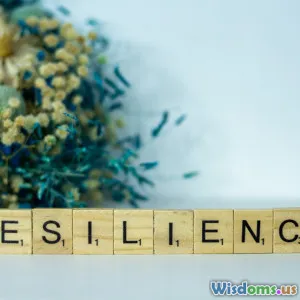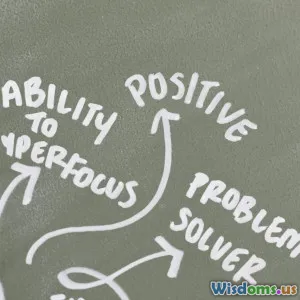
Comparing Grit and Intelligence in Achieving Longterm Goals
7 min read Explore how grit and intelligence uniquely shape long-term success, backed by research and real-world examples. (0 Reviews)
Comparing Grit and Intelligence in Achieving Long-term Goals
Imagine two individuals given an equally ambitious goal—to master a new skill over the course of years. One person learns fast, comprehends concepts immediately, but quickly loses interest when obstacles arise. The other struggles early on, often frustrated, but keeps plugging away relentlessly regardless of setbacks. Who will succeed in the long run?
This classic question pits two powerful traits against each other: intelligence and grit. Both have been heralded as keys to success, but in different ways. Understanding their distinct influences on achieving long-term goals can reshape how we approach learning, career growth, and personal development.
What Is Intelligence?
Intelligence, traditionally measured through IQ tests, is the ability to learn, adapt, analyze, and solve problems effectively. It encompasses cognitive capabilities like memory, reasoning, and processing speed.
Intelligence and Learning Efficiency
Intelligent individuals usually grasp concepts quickly, connecting dots that others might miss. For example, Albert Einstein’s reputed intellectual gifts allowed him to conceptualize relativity, a groundbreaking leap in physics.
In everyday life, intelligence helps by enabling faster acquisition of skills and better problem-solving strategies, providing an edge especially in fields that require deep understanding like mathematics or computer programming.
Limitations of Intelligence
However, intelligence alone doesn't guarantee sustained effort or emotional resilience. Brilliant individuals can face failure from a lack of persistence or motivation. Studies show that relying solely on intelligence can lead to a fixed mindset—believing ability is innate and unchangeable—thus avoiding challenges that provoke failure.
What Is Grit?
Grit is defined as the passion and perseverance for long-term goals. Developed and popularized by psychologist Angela Duckworth, grit emphasizes sustained effort over months or years despite obstacles or plateaus.
How Grit Fuels Endurance
Grit involves a growth mindset and internal drive. Instead of avoiding failure, gritty individuals embrace it as part of the learning process. For instance, J.K. Rowling, who faced numerous rejections before publishing "Harry Potter," epitomizes gritty perseverance.
Research from Duckworth’s studies across diverse groups—from West Point cadets to National Spelling Bee contestants—consistently found that grit predicts success beyond what IQ or talent alone could forecast.
Grit’s Psychological Components
- Consistency of Interest: Maintaining focus in the same direction over years.
- Persistence of Effort: Showing stamina in the face of setbacks.
Both combine to propel individuals through the inertia that often ends many ambitions prematurely.
Comparative Analysis: Grit vs Intelligence for Long-Term Goals
Which Matters More?
The answer isn’t straightforward because success depends on context and the nature of goals.
- For complex problem-solving and innovation, intelligence is foundational. Cognitive sharpness fosters breakthroughs and efficient strategy development.
- For skills requiring repetitive practice and gradual improvement, grit is crucial. Skills like playing an instrument or mastering a language are built through sustained effort.
A famous Stanford study involving cadets found that while intelligence correlated with academic success, grit was a more consistent predictor of completing rigorous training.
Synergy Between the Two
Crucially, grit and intelligence aren’t mutually exclusive: they complement each other. Intelligent people with grit optimize their learning and overcome challenges; gritty individuals with average intelligence can compensate through sheer determination and disciplined habits.
Real-World Examples
- Elon Musk: Widely regarded as highly intelligent, but his drive to push through nearly impossible challenges (e.g., SpaceX rocket failures) highlights grit.
- Thomas Edison: Famously cited for his "10,000 hours" of practice and experiments. Edison’s grit helped invent the lightbulb despite many failures, showing persistence trumps raw intellect alone.
Cultivating Both Grit and Intelligence to Maximize Success
Grit Development Strategies
- Set clear, meaningful goals: Passion fuels perseverance.
- Build resilience: View failures as feedback.
- Practice deliberate effort: Focused practice beats mindless repetition.
Angela Duckworth encourages individuals to find purpose in their work to sustain their grit during hard times.
Enhancing Intelligence
- Lifelong learning: Continuous curiosity improves cognitive pathways.
- Problem-solving challenges: Puzzles, strategy games, and new disciplines stimulate brain plasticity.
- Diversify experiences: Exposure to different fields broadens understanding and intelligence.
Both grit and intelligence benefit hugely from a growth mindset, fostering belief in improvement through effort.
Psychological and Educational Implications
Understanding grit vs intelligence reshapes education and talent development.
- Instead of focusing solely on IQ tests, schools now emphasize grit-building through perseverance-oriented curricula.
- Employers seek candidates demonstrating not only competence but also resilience and adaptability.
A case in point: The US Military’s selection process incorporates grit assessment to predict completion chances for challenging training.
Conclusion: The Balanced Equation of Success
While intelligence equips you with tools to understand and maneuver complexity, grit powers you through the marathon of timeless effort critical for true mastery and achievement. In most long-term endeavors, grit acts as a decisive multiplier of success potential.
Striving for success resembles more a marathon than a sprint—it’s the steady, determined steps over time that bring us across the finish line, often regardless of how fast we start.
Actionable insight: Cultivate your passions, embrace challenges with resilience, and commit to lifelong growth. Balancing intelligence with grit will help navigate any ambition’s rough and rewarding journey.
Suggested further reading: Angela Duckworth’s "Grit: The Power of Passion and Perseverance," Carol Dweck’s "Mindset," and seminal psychological studies on intelligence and perseverance.
Rate the Post
User Reviews
Popular Posts





















